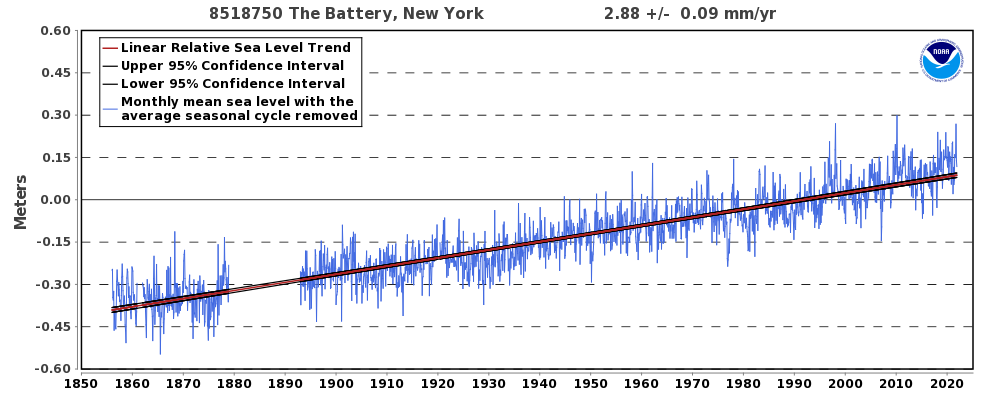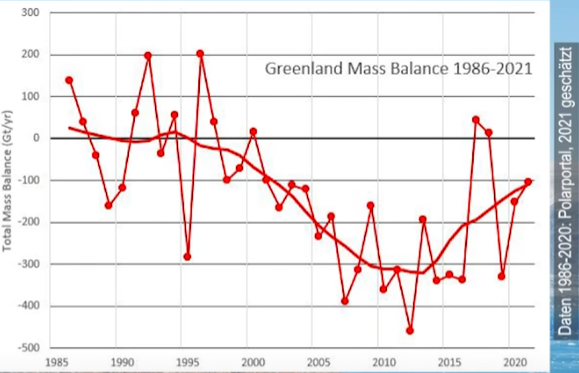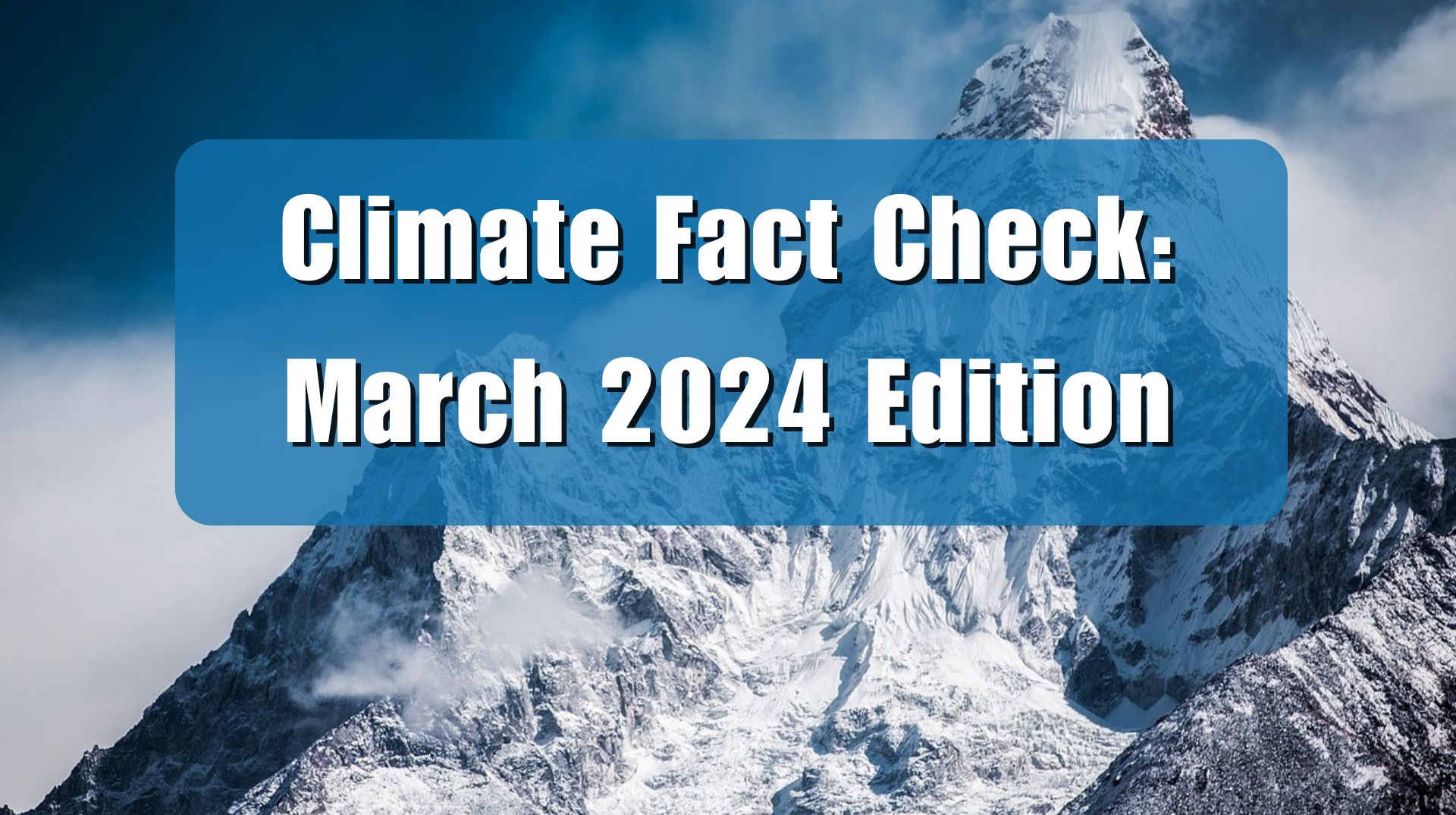A recent article in Axios claims that the current rate of global ice sheet melting and sea level rise will rapidly accelerate unless global warming is stopped before it reaches 1.5°C. Axios also claims that even if greenhouse gas emissions are reduced, sea levels will rise for centuries because of the “delayed response” of ice sheets in Greenland and Antarctica. Axios’ claims are misleading at best. Warming, sea level rise, and ice melt is likely to continue regardless of human-caused greenhouse gas emissions, as it has been going on for far longer than human emissions have been a factor. There is no evidence that any out-of-control “tipping point” exists or is being approached, nor any evidence rates of sea level rise are increasing. Ice mass naturally grows and shrinks in the north and south poles.
The article, “Drastic emissions cuts needed to avert multi-century sea level rise, study finds,” discusses a new study that comes to some old, unoriginal conclusions. Mainly, that unless humans stop emitting greenhouse gasses like carbon dioxide and methane rapidly in order to keep warming to 1.5°C or less (the earth has already warmed 1.2°C) rapid ice melt and rising seas will occur.
Writer Andrew Freedman cites a study published in Nature Communications, to support his story. Describing the study’s methodology, Freedman writes it “utilizes multiple simulations from what are known as “coupled” computer models in which the interactions between the atmosphere, ocean, ice sheets and ice shelves are included and capable of influencing one another over time.”
As is typical, these alarming predictions are based not on observable data, but on computer model projections that have a bias towards human-caused warming. Climate Realism has discussed the problems with climate modelling dozens of times, including here, here, and here, for instance.
In reality, scientists’ understanding of how the atmosphere and clouds, oceans, and polar ice caps interact is limited in scope, with new connections and feedbacks being discovered with some regularity. Because of the immense complexity of the Earth’s climate, it is no wonder that modelers consistently fail to accurately predict future warming and downstream effects like sea level rise.
Regarding sea level rise, current and past trends are hardly alarming. Climate at a Glance: Sea Level Rise shows that global sea level has been rising since the end of the last ices age, far before humans began burning large quantities of fossil fuels, sometimes at rates far above the roughly 1.2 inches per decade measured over the past couple of centuries. (See figure below)

Sea level has already risen more than 400 feet since the end of the last ice age. As explored in Climate Realism, here and here, for example, recent claims that rates of sea level rise have increased in the past few decades are due to an incorrect methodology in accounting for a shift from one set of satellites to a newer set. Tide gauge data does not support the claim that rates of sea level rise are accelerating.
Freedman claims that the research proves “even if global warming slows near or just after 2100, as would be the case in moderate to high emissions scenarios, ice sheet contributions to sea level rise would keep accelerating well beyond that.”
The researchers themselves are quoted as claiming that ice sheet melting will be “similar to a runaway train.”
However, ice melt data demonstrates no evidence such a “tipping point” exists that would lead to runaway melting.
Looking at Greenland, one of the “at risk” locations mentioned in the article, it’s clear that ice mass change fluctuates over time. While there has been a general decline in ice mass, the rate of loss has actually been declining in recent years, despite the modest warming and increasing carbon dioxide in the atmosphere. (See Figure below)

Ice loss in Greenland thus far has been insignificant compared to the ice mass of the entire Greenland ice sheet, the loss each year is around 0.005 percent of the entire mass.
Antarctica’s ice sheets, also mentioned by Freedman as being at risk of melting away, are seeing similarly unalarming melting trends. In fact, recent research concludes that Antarctica has seen a modest expansion of ice over the last several decades, as well as net-zero warming across the continent. Some sections, like the Antarctic Peninsula, are more prone to melting, while the eastern portion of the continent has seen a cooling trend and ice expansion.
The discovery of 800-year-old penguin remains that were revealed after some ice melted away in Antarctica gives good evidence that Antarctica experienced lower ice levels and warming that allowed penguins to inhabit the normally too-icy region during the Medieval Warm Period, which took place between 900 A.D. and 1200 A.D.
The researchers and Freedman claim that the ice sheets are merely “delayed” in responding to global warming. Yet when ice losses begin to mount, researchers claim it shows ice sheets respond to warming nearly immediately. It evidently never occurred to the researchers or Freedman that the climate models could be wrong, as they have consistently been concerning temperatures, and as a result, the response might not be as severe as they hypothesize. Without a return to ice age conditions, sea levels will inevitably rise over time, and ice will melt, regardless of anthropogenic causes. These cycles of warming and cooling are natural elements of earth history. Although humans are likely contributing to warming, available data does not point towards a looming catastrophe from rising seas. Axios probably would have been better served had they taken a more skeptical approach towards computer modelling, relying on publicly available (and easily accessible) sea level and ice melt data instead.
















Studies based on models “prove” nothing. They provide no “evidence”.